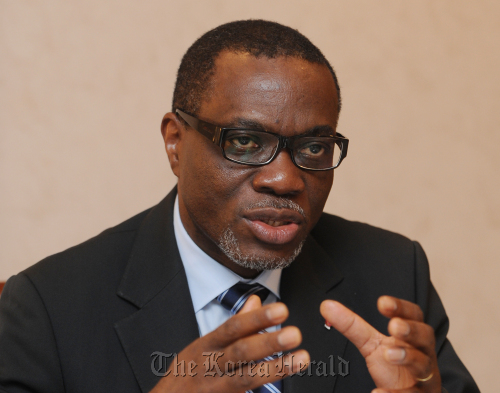Secretary-General Ban Ki-moon is one of the biggest contributions Korea has made to the United Nations over the past two decades, according to Gabon’s permanent representative to the U.N. Noel Nelson Messone.
“It’s very important that Korea has given to the U.N. system one of its brightest, most valuable sons,” the Gabonese ambassador said in an interview with The Korea Herald as he was visiting Seoul to attend an international conference prepared to celebrate the 20th anniversary of South Korea’s joining the U.N. South Korea became a full U.N. member in 1991 with the right to vote.
“Korea has made significant contribution to the U.N.’s development efforts,” said Messone. “And I believe it will continue to play an important part in dealing with new challenges for the U.N. such as development issues, environment and so forth.”
“It’s very important that Korea has given to the U.N. system one of its brightest, most valuable sons,” the Gabonese ambassador said in an interview with The Korea Herald as he was visiting Seoul to attend an international conference prepared to celebrate the 20th anniversary of South Korea’s joining the U.N. South Korea became a full U.N. member in 1991 with the right to vote.
“Korea has made significant contribution to the U.N.’s development efforts,” said Messone. “And I believe it will continue to play an important part in dealing with new challenges for the U.N. such as development issues, environment and so forth.”

Ban, former foreign minister of South Korea, was elected to a second term to lead the international body in June, when Gabon held the monthly presidency of the key Security Council under the rotating system among the Council’s 15 members.
“African countries have good expectations about Ban’s second term,” Messone said.
Messone, who formerly served as Gabon’s deputy foreign minister and ambassador to the Benelux States, was to address various issues during the one-day conference in Seoul Tuesday, including the U.N. reforms, he said.
U.N. members have long been discussing the issue of expanding the Security Council to ensure that the body for international peace and security properly reflects the shift in distribution of power over the past decades.
Over the past six decades, during which the UNSC has been charged with the responsibility of establishing peace-keeping operations and international sanctions, and authorizing military actions, there has been a major shift in the distribution of power.
Despite the general agreement on the fact that reform is necessary in one way or another, members have been undecided over which side ― the permanent or non-permanent membership ― needs to be expanded.
“As an African country, we have a position that is well-known,” said Messon, referring to the African Union’s position backing the expansion of the council. “That is one of the issues I plan to address during the conference.”
On the issue of backing North Korea with food, the Gabonese ambassador said the U.N. “has a responsibility to provide assistance wherever it is needed.”
“If the U.N. comes to determine that there is a dire humanitarian situation regarding food shortages based on its assessment, it may be appropriate that the international community looks at ways to relieve these needs ― in North Korea or elsewhere,” he said.
The U.N.’s food agency, the World Food Program, has been urging the international community to send food aid to Pyongyang despite the communist state’s ongoing nuclear ambitions and provocations. Angry with North Korea for last year’s deadly attacks that killed up to 50 South Koreans, however, the Seoul government has said it has no immediate plans to resume food shipments to the impoverished state.
Messone, who first visited Korea during his teenage years with family who served at the embassy here, said ties between his country and Korea will continue strengthening in all levels.
Gabon “is among the first African countries to have a diplomatic mission in South Korea,” he said.
“Our countries have a very old, historical relationship. We are looking forward to reinforcing those relationships with more cooperation, more South Korean investment in Gabon.”
By Shin Hae-in (hayney@heraldcorp.com)








![[Kim Seong-kon] Democracy and the future of South Korea](http://res.heraldm.com/phpwas/restmb_idxmake.php?idx=644&simg=/content/image/2024/04/16/20240416050802_0.jpg&u=)









![[Today’s K-pop] Zico drops snippet of collaboration with Jennie](http://res.heraldm.com/phpwas/restmb_idxmake.php?idx=642&simg=/content/image/2024/04/18/20240418050702_0.jpg&u=)